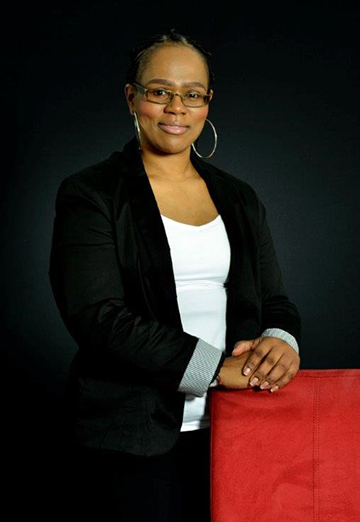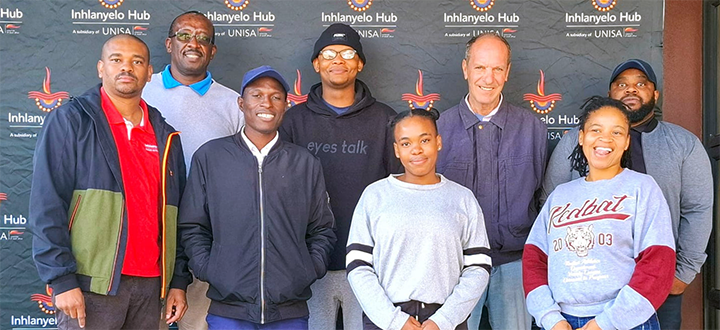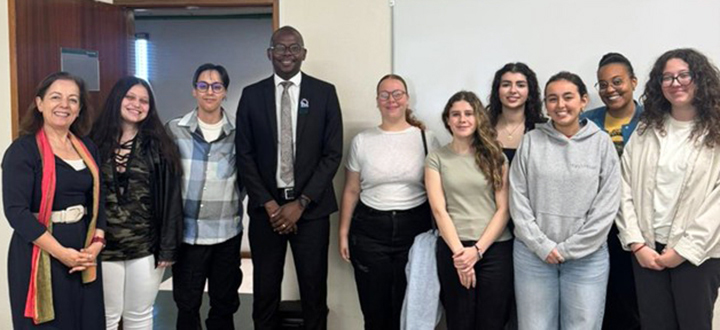News & Media
Earth conservation, zero emissions, 1.5 degrees ceiling

Nomi Mnotoza
By reducing global warming to 1.5 degrees Celsius and maintaining this threshold, the earth could be saved from irreversible damage that could cause extreme weather conditions, food insecurity, droughts and biodiversity loss. This commitment is agreed upon by global leaders worldwide at the 2015 Paris Agreement – a legally binding international treaty on climate change. Nomi Mnotoza, a fervent climate activist from the Unisa Department of Quality Assurance and Enhancement, points out the hurdles and opportunities presented in the journey towards the 1.5 degrees threshold and Unisa's commitment towards the milestone.
What it means to have a clean country
"It means net zero emissions, clean energy, green financing, zero waste to the landfill and green economic practices," says Mnotoza. She also reflects that the South African government, citizens, organisations, corporate businesses and other economic sectors have responded to all these attributes while acknowledging that some industries are yet to commit to sustainability practises. "The net zero status remains elusive in some areas where sustainable developments need improvement. There are still barriers to overcome," she states.
Further, she states that the National Building Regulation of South Africa is a barrier to developing net zero buildings as, she says, it does not require buildings to aim for a net zero status. Moreover, Mnotoza notes that the requirements from national authorities could significantly impact changes in the approach to sustainable development.
Mnotoza affirms that an equitable transition to net zero must be aligned with broader sustainable development objectives, including socio-ecological sustainability and the pursuit of vast economic opportunities.
The climb to net zero
Mnotoza states that South Africa may take some time to reach the net zero status because of a lack of government incentives and a lack of knowledge, which, she says, form part of the obstacles to sustainable development. On the other hand, she acknowledges the organisations pushing the agenda towards the net zero status, such as the Green Building Council South Africa (GBCSA), which launched and certified the first four buildings in South Africa under its Net Zero Pilot Certification scheme in October 2017.
She continues, "The United Nation (UN)'s goal is to achieve net zero emissions by 2050; moreover, GBCSA has set a mandate for the new buildings to operate at net zero carbon by 2030 and all buildings reach net zero carbon status by 2050."
Alternatives towards clean energy
Mnotoza states that South Africa has implemented a renewable tax incentive to encourage companies who opted for solar power systems to release pressure from the national power utility Eskom's grid. However, she says that there are many grey areas in implementing this incentive, and less advantaged communities are not given the necessary attention. She continues: "The government should have come up with a meaningful renewable energy transition from fossil fuel to clean energy by involving local businesses to implement projects to install solar power panels in each Reconstruction and Development Programme (RDP) house and the informal settlements. This idea would have killed two birds with one stone by creating jobs for the youth and reducing unemployment."
The fate of our planet is in our hands
Mnotoza says the next few years are crucial in that every individual must be aware of and undertake every measure to be mindful of the 1.5 degrees Celsius climate threshold since this breach will create irreversible damage to the planet and nature.
"Therefore," she continues, "a local and integrated approach is essential for individuals, households and municipalities to understand their impact on climate on the planet. To address the challenge of climate change, all city departments, local stakeholders and communities must engage proactively."
She further states that local schools may play a significant role too in terms of engaging and encouraging scholars to be involved in the climate change movement, pleading that this can be in the form of competitions, public speaking, school debates and with one another, noting that in this way scholars will be learning and gaining knowledge about what is happening with the country and globally.
Student level focus
Mnotoza says that the Sustainability Unit has started to engage with the Unisa office of the Dean of Students and the Student Representative Council to establish the Sustainability Desk that will deal with sustainability matters at a student level and spark conversations on protecting nature and tackling the climate crisis.
She explains: "With the UN 2030 agenda for sustainable development goals in mind, the university is stepping things up this year. The Sustainability Unit will lead several campaigns or initiatives to raise awareness on climate change, biodiversity protection, environmental protection, and sustainable development goals."
"Unisa has several energy-renewable community engagement projects currently run by the College of Science, Engineering and Technology (CSET), led by Professors Mahlanyane Mathe, Acting Head for Institute for Catalysis and Energy Solutions (ICES), and Xinying Liu Head of XTL/FTS research group in the Institute for the Development of Energy for African Sustainability (IDEAS)," Mnotoza concludes.
* By Godfrey Madibane, Acting Journalist, Department of Institutional Advancement
Publish date: 2023-05-24 00:00:00.0


 Inhlanyelo Hub inspires future entrepreneurs
Inhlanyelo Hub inspires future entrepreneurs
 Racialised global politics and Afrikaner voices
Racialised global politics and Afrikaner voices
 Unisans compile pioneering collection of previously unpublished Afrikaans poems
Unisans compile pioneering collection of previously unpublished Afrikaans poems
 FutureMinds Bootcamp set to revolutionise Maths learning through artificial intelligence
FutureMinds Bootcamp set to revolutionise Maths learning through artificial intelligence
 Erasmus+ initiative paves way for Dr Letsoalo’s visit to the University of Aveiro
Erasmus+ initiative paves way for Dr Letsoalo’s visit to the University of Aveiro